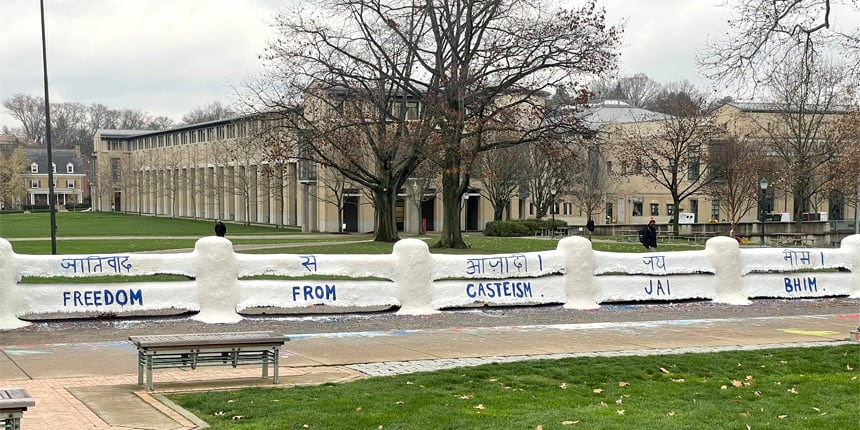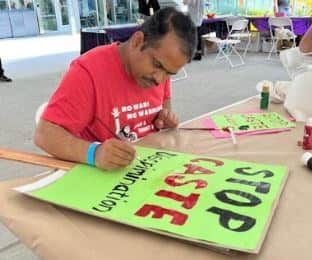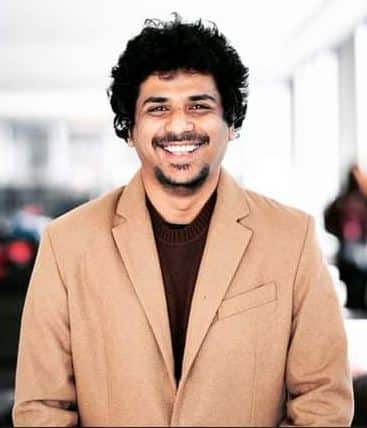‘Caste is a problem among South Asian students everywhere’; US universities are recognising it
Sanjay | December 12, 2022 | 10:38 AM IST | 9 mins read
Meet the South Asian students, teachers working to get historically-marginalised castes protected status in US universities.

New Delhi: After facing attacks on his family in a caste-based incident in Nepal’s Kathmandu in 2014, Prem Pariyar moved to the US in 2015 to “escape the caste apartheid” and for a better career. But he faced caste discrimination again while pursuing a master’s course from 2019 to 2021 at the California State University (CSU) East Bay.
Pariyar hails from a Dalit community in Nepal and is currently working as a caste equity oraniser with Equality Labs, a nonprofit Dalit civil rights organisation based in San Francisco, California.
He was waiting at a Bay Area train station when he met two other Nepali students, also attending CSU East Bay. They chatted about the course and the exchange was friendly until they heard his name, which revealed his caste, “They stared at me from top to bottom and smiled at each other. I felt very uncomfortable with their behaviour,” he said.
Pariyar attempted to raise awareness about caste descrimination among university students and teachers, speaking about it in his social work classes, but with little support. “My Afro-American professor was surprised and asked my other South Asian colleagues if they had heard of caste discrimination. They responded that they had not. They did not want to validate my experience but wanted to silence my voice. After knowing my identity, they stopped talking to me,” he said.
The CSU system
Pariyar and a group of South Asian students organised conferences and campaigns to raise caste awareness. They convinced authorities to add the caste as a protected category.

The entire CSU system, with 23 campuses and seven off-campus centers, added caste to its non-discrimination policy in January 2022. It is the largest public university system in the United States with almost five lakh students and 29,000 teachers.
But even before the statewide policy change, from 2019, a number of pubic and private institutions or their departments had added safeguards against caste discrimination to their policies. These include Brandeis University, Massachusetts (in December 2019); University of California, Davis (October 2021); and Harvard University (December 2021).
Also Read | Brown University adds caste to its non-discriminatory policy
The institutions have described caste as a “century-old practice” and “structure of violence” among South Asian countries. According to professors in US universities, humanities and social science departments in the US universities are full of upper-caste students and faculties and students from marginalised communities face descrimination. However, there has been opposition from the rightwing advocacy group, Hindu America Foundation (HAF).
40% Dalits reported discrimination
The US-based Institute of International Education in its Open Doors report found that close to two lakh Indians were studying in the US in 2021-22. The number has more than doubled since 2012-13.
Author and journalist Dilip Mandal pointed out that with the benefit of their social and cultural capital, it was upper-caste students who went abroad for higher studies in the initial years after Independence. “With more scholarships and support from authorities, more students from marginalised communities are going abroad for education now,” he said.
However, there are still many barriers.
Applicants need to submit letters of recommendation. “These depend on the student's relationship with professors in their undergraduate institute and there have been cases of upper-caste professors favouring upper-caste students,” said Kaustubh Somnath Naik, PhD student at University of Pennsylvania.

Also Read | A Dalit student in Oxford University: Sumeet Samos on caste, merit, studying abroad
In 2015-16, Equality Labs conducted the first-ever survey about caste in the US and released the report in 2018. 40% of Dalit students reported facing discrimination in educational institutions. It recommended that the disciplinary committee and international student services in colleges and universities should sensitise themselves to the issue of caste.
Caste made headlines
Caste made headlines in US with the Cisco case in which a Dalit employee alleged systematic discrimination by two upper-caste supervisors. In July 2020 California’s Department of Fair Employment and Housing regulators sued the US multinational technology company for caste-discrimination. The case is still going on. Ambedkar International Center (AIC), an US-based organisation has filed an amicus brief in the CISCO case, challenging the HAF’s amicus brief, which had argued that the caste system is not part of Hinduism.
Anil Wagde, an AIC-member, has been organising conferences and workshops in US campuses and offices to raise awareness about caste. “I have been in the US for nine years. My son is currently doing a PhD in the US. I approved his PhD plans after he told me his professor is not an upper-caste Indian. My son’s PhD could have been spoiled if he was and found out about his caste and my activism. These are the conscious decisions we have to take,” he explained.
The Cisco case and scholarly works by the likes of Ajantha Subramanian and Cornel Ronald West, along with talk events by Dalit activists and authors Thenmozhi Sundarrajan and Suraj Yengde, have raised awarness about caste among US citizens, said Mandal.
‘Can no longer ignore’
Sibin Mohan, associate professor in the department of computer science, George Washington University, explained that the South Asian populations in the US have been dominated by the upper castes and no one really raised the issue of caste in the US.
“Now the problem is becoming more obvious and they can no longer ignore the issue. As more students from different backgrounds are coming to the US, they are likely seeing or experiencing caste-based discrimination, jokes and abuses even in the US. So they are petitioning their universities to pay attention to the issue. American universities have long paid attention to inequities and are starting to recognise another one,” he said.

Also Read | ‘Ambedkar himself would be stopped’: New rules stifle NOS scholars’ freedom to study own communities
‘Model minority myth’
“I think the winds are changing as more universities start to acknowledge the issue,” said Mohan. “The recognition of caste by universities will clamp down on any abuse or unfair practices on campus. It will allow for students to flourish without having this hovering over their heads. It will allow universities to pay attention to inequalities suffered by students who are not upper-caste. Universities can lobby for new policies at the US federal and state government levels, perhaps even internationally to help such marginalised communities and become a force for positive change.”
The recognition of caste by US universities will initiate a conversation around caste out in the open among the US Indian diaspora, added Gaurav Sabnis, associate professor at Stevens Institute of Technology, New Jersey. “For too long, we have built up the model minority myth that also pushes the Indian American experience as somehow post-caste. But that's not the reality, and this recognition will help raise awareness about it. In direct terms, this will give Indian students of marginalised communities a way to actively fight back against discrimination. What California does, usually gets adopted elsewhere. I am sure that within a few years, almost all universities that have anti discrimination policies will include caste in there,” he said.
Student groups are pushing for change through actions like painting “freedom from casteism” and “end caste discrimination” on the Fence at Carnegie Mellon University, Pennsylvania, in November 2022. The Fence, according to the CMU website, is the “unofficial university billboard” and routinely painted and guarded by students with a message to communicate.
“If it’s on the fence, most likely, people are going to read it. Our goal was to inform the campus community about the caste system and how it affects millions of people globally, including in the United States, and inform them about our movement. It was a planned event and my Mexican, Peruvian, American, and Indians friends helped paint the fence,” said Bikash Gupta, a public policy student at CMU. “We are working towards making authorities include caste in the university’s anti-discrimination policy statement. We will be reaching out to student clubs and governments. We also hope to reach out to alumni and faculty as we approach the administration in a month's time.”
Opposing the movement
After opposing the State of California’s lawsuit against Cisco in courts, the HAF is now supporting two professors Sunil Kumar and Praveen Sinha in their lawsuit against their employer (CSU) to prevent the university from enforcing a non-discrimination policy that has included caste as a protected status. Although the HAF says it is not affiliated to any religious or political organisation, its co-founder Mihir Meghani is actively involved with the Vishwa Hindu Parishad of America.
“CSU has created a dangerous precedent of institutionalising bias against Hindu faculty and students of Indian origin,” Samir Kalra, HAF’s managing director was quoted as saying in a press statement dated October 18, 2022.
Also Read | Faculty members oppose inclusion of caste in California State University's anti-discriminatory policy
Although the HAF and Sinha acknowledged the mails Careers360 sent to them, neither responded to the questions.
“HAF is treating the inclusion of caste in US universities policies as a threat to their hegemonic domination in academic and other places in the US,” said Mandal.
Sabnis described HAF’s position as “bizarre”. “It is not like this policy change means that everyone can start suing over caste and get awarded damages,” he said. “The bar to prove discrimination legally is still pretty high. CSU policies have given caste a protected category status that gives it legal basis to punish casteism, if it occurs. If you're not a casteist, then you have nothing to fear from caste being included as a protected category.”
Follow us for the latest education news on colleges and universities, admission, courses, exams, research, education policies, study abroad and more..
To get in touch, write to us at news@careers360.com.